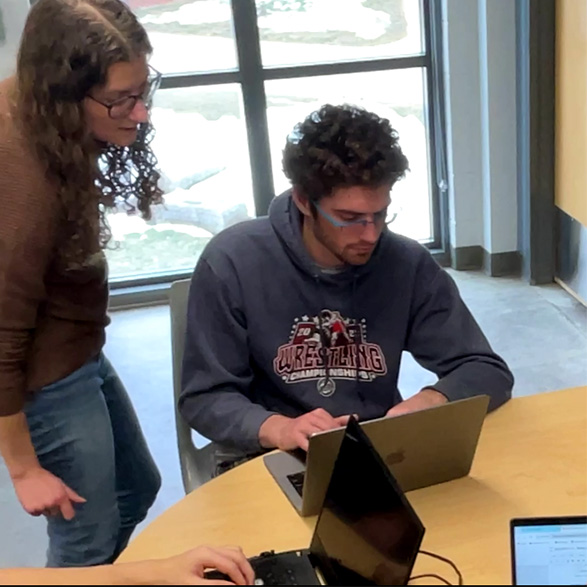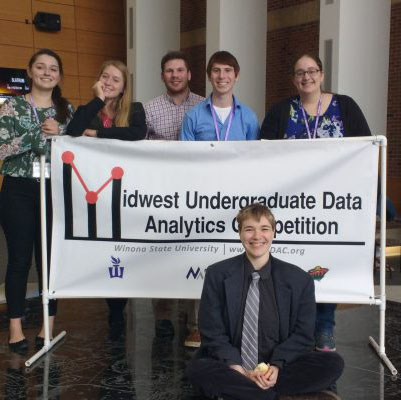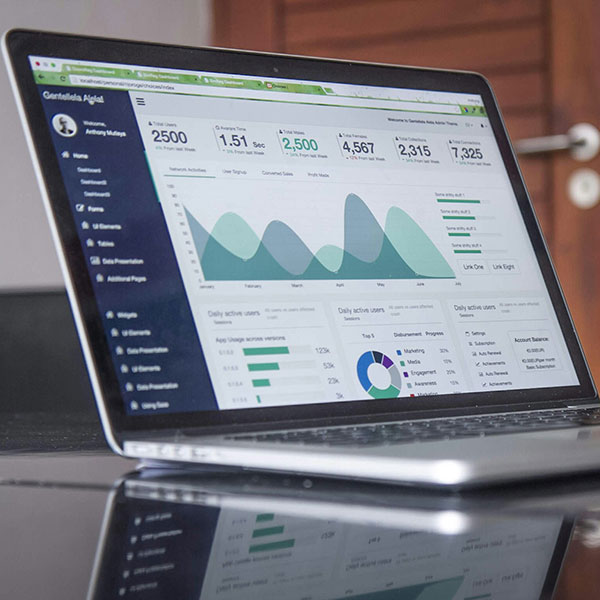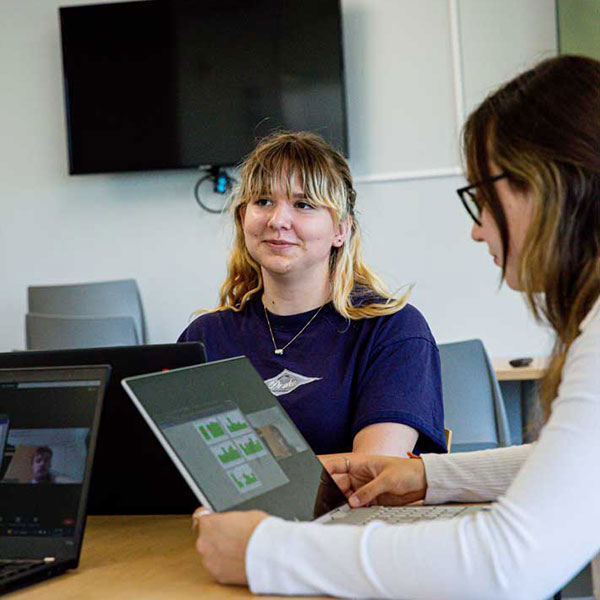Data Science Major
Why choose a major in data science at Cornell College?
Data science graduates are high in demand. We developed this program of study in response to industry needs for people who not only understand how data is structured, but also how to interpret it to solve day to day problems.
You’ll work with faculty knowledgeable in computer science, mathematics, and statistics because, at its core, data science is interdisciplinary–computer science gives you the skills to write programs to analyze data, a background in mathematics and statistics allows you to interpret the data, and your liberal arts education empowers you to translate the needs from other fields into your approach for analysis.
In fact, you’ll find benefit in exploring courses in Computer Science, Data Science, and Applied Statistics as you pursue your degree. Opportunities in data science span industries. Three of our recent grads landed roles as a Data Scientist with Fiserv in Sunnvale, CA; a Business Analyst with OFC Hospitals in IL; and a Data Journalist at Three Ships in Raleigh, NC.
Cornell College enables you to dive in and immerse yourself in each subject without distraction. You’ll have the opportunity to experience aspects of data science that are outside the reach of most undergraduates thanks to our block plan schedule.
Cornell Summer Research Institute: using data to create predictive models
Using large datasets from hospitals resulted in a summer research project that used a methodological approach to find patterns in data to identify when doctors misdiagnose people. The application of the findings is to create a system that recommends when doctors might be missing something.
Recent CSRI projects that have incorporated data science methods have focused on COVID-19, water quality, the origins of pottery, predicting NO3 levels, creating interactive homework, investigating convictions, and the analysis of parasitic wasps. The options are only limited by the question you want to ask and availability of data.
Data science course and degree requirements
In your courses you will learn how to approach the challenges of analyzing large data sets and complicated data sets.Your work will span organizing and clarifying the data to analyzing the data and communicating the results in language that the client will understand. You will learn computer science and statistics, as well as how to translate real world questions from other disciplines into approaches that can be answered through data. Your courses will take you into the field too, maybe across an ocean–travel with your class to Ireland and the United Kingdom to study the origins of statistical analysis in off-campus study course STA257.
Data science capstone
Over your senior year, you will work with your capstone advisor to apply all that you have learned. You will start by picking an area of interest and gathering relevant data. Then you will use the knowledge you have gained through your years at Cornell to analyze the data. Block 6 is reserved for you to write your capstone paper and prepare for your presentation at the Cornell Student Symposium. An examination of the Nitrate levels in Iowa watersheds resulted in a digital Watershed Dashboard capstone for one Cornell senior.

Research within the data science major
You’ll have ample opportunities to build up your research skills within this major. You’ll conduct research projects within some courses, and may have the opportunity to work with faculty within their research projects or develop your own. Alternatively, faculty and the coaches at the Berry Career Institute can help you obtain internships with governmental or private firms working in your area of interest.
You’ll also have the opportunity to take your research results on the road and present your findings at the Iowa Chapter of American Statistical Association conference, where you can see what other students are researching, talk with industry experts, and make new connections (and maybe win a cash prize for your presentation).

Honing your skills with competitions in data science
Working with a team of your classmates to solve a problem with large datasets in competition with many other teams at a weekend competition sounds great, right? Cornellians regularly compete at the Midwest Undergraduate Data Analytics Competition (MUDAC) to do just that. Solve problems using a dataset: review season ticket renewals for a hockey team to develop models that would maximize the future renewal rate for the sports team, working with real data to identify an implementable solution, means you have a foundation for approaching a future problem (like dazzling your new employer).
Internships with the data science major
As part of your data science major, you might take on an internship in technology, business, or other firms in various industries. Working with employers and gaining real-world experience is not only a great way to learn more about data science and its applications but to boost your marketability with employers when you graduate. Internships in data science can be found at businesses, or a little closer to home. Recent internships have included work with the NE Fisheries in Woods Hole, MA; Cornell’s own baseball team, and the Cornell Office of Alumni and College Advancement.
An internship can also assist you in graduate program applications and recommendations by highlighting real-world work you've completed and giving you networking opportunities.

What you can do with a data science major
The mean annual wage in 2022 (latest update) for data scientists was listed at $115,240 per The U.S. Bureau of Labor Statistics.
Potential industries for data scientists include…everything. Everywhere there is data, there is the opportunity to use it for meaningful analysis and strategic approaches to problem solving. Currently data scientists are most in demand in the pharmaceutical, automotive, manufacturing, business, and technology industries.
Studying STEM at Cornell College
As an incoming student interested in STEM fields, you'll be part of a vibrant community who are interested in discovering and impacting how the world around us works.


